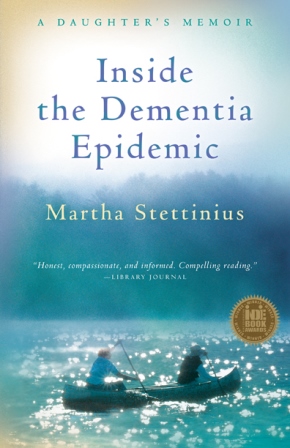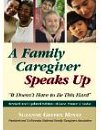Resources
Books about Caregivers' Needs
One of my favorite books about finding enough caregiving support is:
A Family Caregiver Speaks Up: It Doesn't Have to Be This Hard, by Suzanne Geffen Mintz, 2007. Mintz is the President and Co-Founder of the National Family Caregivers Association, an advocacy and support network for all family caregivers. (I serve as a volunteer NFCA representative for New York State. Click here for my profile, and here to download the presentation about NFCA I made to the New York State Bureau of Long-Term Care Services and Caregiver Supports.)
More of my favorite books that support caregivers include:
The Mindful Caregiver: Finding Ease in the Caregiver Journey
by Nancy L. Kriseman, LCSW, 2014
Kriseman is a geriatric social worker with over 30 years of experience working with elders and their caregivers. A comprehensive guide to bringing “mindfulness” to family caregiving, her book encourages caregivers to put their needs first. (Read my full review here.)
The Caregivers: A Support Group's Stories of Slow Loss, Courage, and Love
by Nell Lake, 2014
As a journalist, Lake observes the members of a caregiver support group at her local hospital, following their stories as they unfold over two years. Rarely will we read such an in-depth look at a broad cross-section of family caregivers—those who care for loved ones in their home, and those who care for and advocate for their loved ones in a facility, as well as caregivers for loved ones with a range of diagnoses. (Read my full review here.)
The ABCs of Caregiving: Words to Inspire You,
by Nanette J. Davis, Ph.D., 2013
If you read this short book a section or two at a time, like a meditation, you may feel inspired to take some simple steps to put your needs first. You may also feel more appreciated for your work as a caregiver, more compassion for yourself, and more hopeful.
The Caregiver's Path to Compassionate Decision Making: Making Choices for Those Who Can't, by Viki Kind, MA, 2010. I wish I had this book in 2005 when I started making decisions about my mother's care. As caregivers, we often feel guilt about these decisions, and Kind's gentle reassurance and practical guides will do much to alleviate this anxiety.
Passages in Caregiving: Turning Chaos Into Confidence, by Gail Sheehy, 2010. A must-read! I appreciated Sheehy's description of 8 stages of caregiving, from "Shock and Mobilization" to "The Long Good-bye."
Loving Someone Who Has Dementia: How to Find Hope While Coping with Stress and Grief, by Pauline Boss, Ph.D., 2011, author of Ambiguous Loss. Our loved ones with dementia are both here and not here, and while our loss as caregivers comes in stages, often over years and years, we also come away from dementia caregiving with new insight and strength. Boss shows us how we can "learn how to live with the ambiguity that comes wtih dementia."
A Bittersweet Season: Caring for Our Aging Parents--and Ourselves, by Jane Gross, 2011. Gross, a journalist for the New York Times, has written a stunning combination memoir and "how to" book about caring for her mother and what she learned along the way about elder care quandries such as Medicare, Medicaid, and how to choose an assisted living facility.
When the Time Comes: Families with Aging Parents Share Their Struggles and Solutions, by Paula Span, 2009. I wish this book had been available in 2005 when I started caregiving. Reading it again now, I'm struck by how the scenes she describes ring true. Span, a journalist who currently writes The New Old Age blog for the New York Times, calls the book a "support group in print," and it is indeed more than a "how to" book. She alternates portaits of families and their particular caregiving challenges with informational chapters and lists of questions to think about if you're considering, for example, having your parent live with you, or moving your parent into an assisted living facility or nursing home. It's likely that you will see your situation in at least one of the families in the book, and, like in a support group, feel much less alone in the decisions you face.
The Emotional Survival Guide for Caregivers—Looking After Yourself and Your Family While Helping an Aging Parent. Barry J. Jacobs, Psy.D., 2006. Jacobs helps family members navigate tough decisions and make the most of their time together as they care for an aging parent. While acknowledging their guilt, stress, and fatigue, he helps caregivers reaffirm emotional connections worn thin by the routine of daily care. This compassionate book will help families everywhere avoid burnout and preserve bonds during one of life's most difficult passages.
Caring for Our Parents: Inspiring Stories of Families Seeking New Solutions to America's Most Urgent Health Crisis, by Howard Gleckman, 2009. A readable, comprehensive discussion of the challenges that face caregivers, in which the author follows the stories of several families over several years. Gleckman is a veteran journalist with expertise in economic and fiscal policy, personal finance, and health care. He offers here one of the best discussions I've seen of the merits and pitfalls of private long-term care insurance; how other countries approach paying for long-term care; and what possible solutions to our long-term care crisis will look like.
To Survive Caregiving: A Daughter's Experience, A Doctor's Advice on Finding Hope, Help and Health, by Dr. Cheryl E. Woodson, 2007. Another book I wish I had known about years ago. Dr. Woodson gives us a very readable, personal book of practical advice for caregivers, and I found her stories about caring for her own mother, who had dementia, very moving.
The Complete Eldercare Planner, Revised and Updated Edition: Where to Start, Which Questions to Ask, and How to Find Help, by Joy Loverde, 2009.
You Want Me to Do What? Journaling for Caregivers, by B. Lynn Goodwin, 2008.
The Selfish Pig's Guide to Caring: How to Cope with the Emotional and Practical Aspects of Caring for Someone, by Hugh Marriott, 2003 (first published in Great Britain, where the word for "caregiving" is "caring"). I love his sardonic humor. "Martyrdom," he says, for example, "can be quite beguiling."
Share the Care: How to Organize a Group to Care for Someone Who is Seriously Ill, by Cappy Caposella and Sheila Warnock, 2004. Caregivers often think, at least at first, that they can do everyone by themselves. That cannot last; we all need help and support. Any caregiver—or a friend or family member of a primary caregiver—can organize a group of people to share the care: the driving, doctor appointments, cooking, cleaning, phone calls to check in, and visits.
Good Daughters: Loving Our Mothers as They Age, by Patricia Beard, 1999. An excellent book for daughters who struggle, as I did, with their new role of caregiver for their elderly mothers. From the book jacket: "In stories gathered from hundreds of interviews, she offers clearheaded and openhearted insights into the practical and emotional problems that confront mothers and daughters...and shows how even in the last, difficult phase, they can face change and loss with courage, compassion, and a stronger relationship."
Stuck in the Middle: Shared Stories and Tips for Caregiving Your Elderly Parents, by Barbara McVicker and Darby McVicker Puglielli, 2008. McVicker writes about her own experience caring for her parents and two children, provides short stories by other family caregivers, and offers many practical tips.
Caring for Yourself While Caring for Your Aging Parents: How to Help, How to Survive, by Claire Berman, 2005.
More Caregiver Resources:
Memoirs about Dementia or Caregiving
Dementia Care Guides
Books about Changing Elder Care
Novels about Dementia



















 aging parents
aging parents